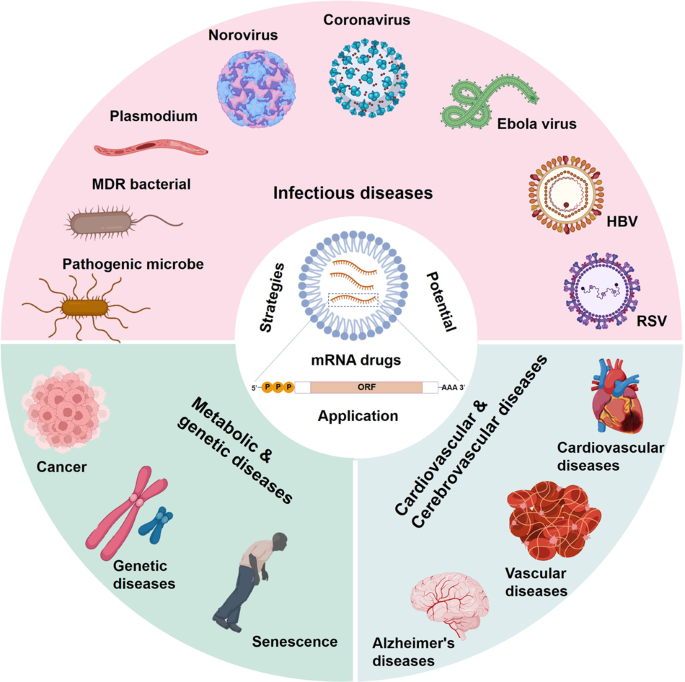- Home
- Prelims
- Mains
- Current Affairs
- Study Materials
- Test Series
Therapeutic use of messenger RNA (mRNA)
The cells in our body create mRNAs that serve as instructions to make specific proteins we need to function. Researchers can create new mRNAs to correct those instructions when they aren’t working.
- While most scientists studying mRNAs are not creating new drugs, this fundamental understanding of how mRNA works laid the foundation for other scientists to create effective mRNA medicineslike Covid-19 vaccines.
mRNA
- mRNA (Messenger RNA)carries important messages from our DNA (Deoxyribonucleic acid), to the cell''s machinery, telling it how to make specific proteins.
- Imagine DNA as a library of cookbooks filled with recipes (genes) to create different proteins.
- Our bodies need around 100,000 proteins to work properly,helping with tasks like breaking down food and performing vital chemical reactions.
- When a cell needs a specific protein, it doesn''t directly read the recipe from DNA. Instead, it makes a copy called mRNA.
- This mRNA serves as a messenger, carrying the protein-making instructions. It''s made up of four building blocks (A, U, C, G), forming words of only three letters.
- By reading this mRNA recipe, cells easily know how to create the required protein.
- Cells are quite good at recognizing, using, and then getting rid of mRNA once it''s done its job.
- However, changes or mistakes in the DNA''s recipe book (mutations) can mess up the mRNA instructions, leading to errors in making essential proteins, which can cause diseases.
Significance of mRNAs in Making Medicine
- Precision and Customization:
- Scientists comprehend how mRNAs instruct cells to create proteins. This knowledge allows them to easily craft codes for various proteins, modifying these codes to suit individual patient needs.
- Whether it''s designing entirely new mRNA codes or adjusting existing ones, the flexibility allows for tailored treatments.
- Scalability and Uniformity:
- Manufacturing mRNA treatments is scalable and consistent. The process to create one mRNA is uniform across different mRNA types.
- Unlike traditional drugs, each having unique chemistry and manufacturing methods, mRNA production follows a standardized process. This uniformity streamlines production, akin to knowing a basic recipe and being able to create countless variations.
- Easy Adaptability:
- Cells naturally eliminate mRNA once its task is complete. This characteristic ensures that mRNA treatments are not permanent.
- Adjusting doses to accommodate changing patient requirements becomes effortless due to this innate ability of cells to degrade unnecessary mRNA.
- Production Capacity:
- Scientists can generate substantial quantities of mRNA in laboratory settings. This ability to produce large amounts facilitates the development and distribution of mRNA-based medicines on a broader scale.
- Expanded Vaccine Development:
- Clinical trials for mRNA-based vaccines extend to diseases like seasonal flu, herpes, respiratory syncytial virus, norovirus, Lyme disease, Zika, and shingles, promising a wider array of preventive treatments.
- mRNA therapies show promise in cancer treatment by leveraging the body''s immune response.Cancer vaccines, tailored to target specific mutations in tumors, enhance antibody production to mark and attack cancer cells. This personalized approach seeks to minimize harm to healthy cells.
- Clinical trials for mRNA-based vaccines extend to diseases like seasonal flu, herpes, respiratory syncytial virus, norovirus, Lyme disease, Zika, and shingles, promising a wider array of preventive treatments.

Future of mRNA Based Medicines
- The future of mRNA-based medicine appears promising, offering highly personalized, effective therapies with fewer side effects.
- This revolutionary approach holds the potential to address diverse diseases by precisely altering cellular processes and correcting protein deficiencies.
- The ease of customization and productionpositions mRNA as a versatile tool in modern medicine, poised to redefine treatment strategies and improve patient outcomes across various medical conditions.









 Latest News
Latest News
 General Studies
General Studies